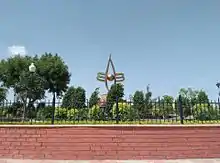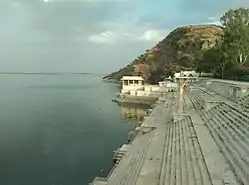Rajsamand district | |
|---|---|
     Clockwise from top-left: Kumbalgarh Fort, Anjana Fort, Third Eye Circle in Nathdwara, Rajsamand Lake, Statue of Maharana Pratap at Haldighati | |
.svg.png.webp) | |
| Coordinates: 25°04′N 73°52′E / 25.067°N 73.867°E | |
| Country | |
| State | Rajasthan |
| Division | Udaipur |
| Headquarter | Rajsamand |
| Established | 10 April 1991 |
| Founded by | Rana Raj Singh |
| Named for | Rajsamand lake |
| Area | |
| • Total | 4,550.93 km2 (1,757.12 sq mi) |
| • Rank | 19 |
| Population (2011)[1] | |
| • Total | 1,156,597 |
| • Density | 217/km2 (560/sq mi) |
| Languages | |
| • Official | Hindi, Rajasthani |
| • Regional | Mewari |
| Time zone | UTC+5:30 (IST) |
| PIN | 313324/26 |
| Telephone code | 02952 |
| Vehicle registration | RJ-30 |
| Lok Sabha constituency | Rajsamand (Lok Sabha constituency) |
| Nearest city | Udaipur, Chittorgarh, Bhilwara, Ajmer |
| Avg. annual temperature | 22.5 °C (72.5 °F) |
| Avg. summer temperature | 45 °C (113 °F) |
| Avg. winter temperature | 00 °C (32 °F) |
| Website | rajsamand |
Rajsamand District is a district of the state of Rajasthan in western India. The city of Rajsamand is the district headquarters. The district was constituted on 10 April 1991 from Udaipur district by carving out 7 tehsils - Bhim, Deogarh, Amet, Kumbhalgarh, Rajsamand, Nathdwara, and Railmagra.[2]
Geography
The district has an area of 4,768 km2. The Aravalli Range forms the northwestern boundary of the district, across which lies Pali District. Beawar District lies to the north, Bhilwara District to the northeast and east, Chittorgarh District to the southeast, and Udaipur District to the south. The district lies in the watershed of the Banas River and its tributaries. Some other rivers are: Ari, Gomati, Chandrabhaga
Demographics
| Year | Pop. | ±% p.a. |
|---|---|---|
| 1901 | 187,692 | — |
| 1911 | 232,110 | +2.15% |
| 1921 | 246,483 | +0.60% |
| 1931 | 282,066 | +1.36% |
| 1941 | 336,384 | +1.78% |
| 1951 | 395,465 | +1.63% |
| 1961 | 470,115 | +1.74% |
| 1971 | 553,189 | +1.64% |
| 1981 | 693,358 | +2.28% |
| 1991 | 819,014 | +1.68% |
| 2001 | 982,523 | +1.84% |
| 2011 | 1,156,597 | +1.64% |
| source:[3] | ||
According to the 2011 census Rajsamand district has a population of 1,156,597,[1] roughly equal to the nation of Timor-Leste[5] or the US state of Rhode Island.[6] This gives it a ranking of 405th in India (out of a total of 640).[1] The district has a population density of 302 inhabitants per square kilometre (780/sq mi) .[1] Its population growth rate over the decade 2001-2011 was 17.35%.[1] Rajsamand has a sex ratio of 988 females for every 1000 males,[1] and a literacy rate of 63.93%. 15.89% of the population lives in urban areas. Scheduled Castes and Scheduled Tribes make up 12.81% and 13.90% of the population respectively.[1]
Languages of Rajsamand district (2011)[7]
At the time of the 2011 Census of India, 75.36% of the population in the district spoke Mewari, 17.19% Rajasthani, 5.30% Hindi and 0.97% Marwari as their first language.[7]
Places to interest
Rajsamand district had lot of natural and historical places to visit.
References
- 1 2 3 4 5 6 7 "District Census Handbook 2011 - Rajsamand" (PDF). Census of India. Registrar General and Census Commissioner of India.
- ↑ District Census Handbook Rajsamand PART XII-A (PDF). Directorate of Census Operations. 2011. Retrieved 30 March 2019.
- ↑ Decadal Variation In Population Since 1901
- ↑ "Table C-01 Population By Religion - Rajasthan". census.gov.in. Registrar General and Census Commissioner of India.
- ↑ US Directorate of Intelligence. "Country Comparison:Population". Archived from the original on 13 June 2007. Retrieved 1 October 2011.
Timor-Leste 1,177,834, July 2011 est.
- ↑ "2010 Resident Population Data". U. S. Census Bureau. Retrieved 30 September 2011.
Rhode Island 1,052,567
- 1 2 "Table C-16 Population by Mother Tongue: Rajasthan". censusindia.gov.in. Registrar General and Census Commissioner of India.
